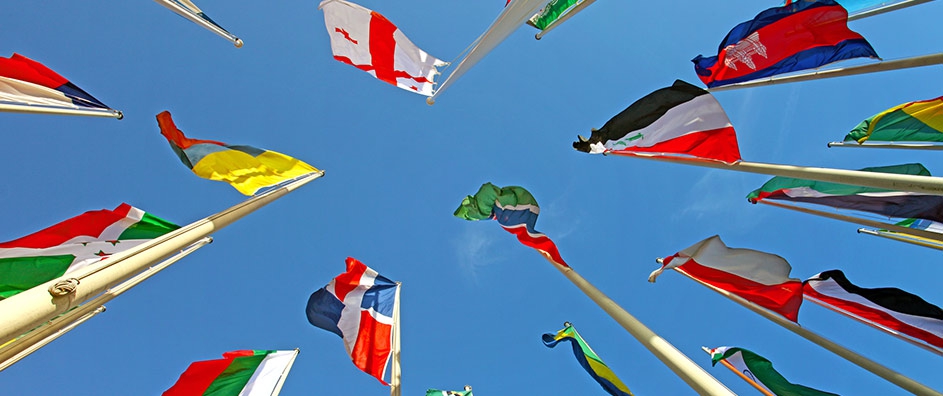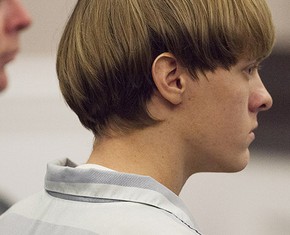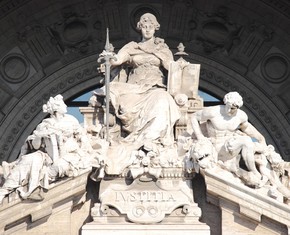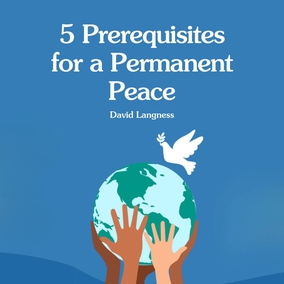The views expressed in our content reflect individual perspectives and do not represent the authoritative views of the Baha'i Faith.
The United Nations operates with a fifteen-member Security Council as its executive, its legislative and its judicial branch. That structure has caused severe problems.
Here’s how it works: the Security Council has five permanent members—France, The People’s Republic of China, Russia, the United Kingdom and the United States. Any one of those nations can veto any UN resolution. The Security Council’s ten non-permanent members are elected from their regions, and they serve two-year terms. They do not have individual veto power.
Because of this concentration of absolute power in the hands of the five permanent members of the Security Council—who represent the victorious countries in World War II—the UN isn’t generally regarded as representative of the world’s peoples. All five Security Council nations are nuclear powers; and four out of five are predominantly white Western countries. That means none of the UN’s actual leadership comes from the global South or from developing countries anywhere in the world.
The other severe problem with this structure lies in its lack of real authority. No actual sanctions or consequences exist for countries that violate Security Council resolutions, so they’re routinely violated or ignored. For example, the UN Security Council has done little to resolve the current crisis in Syria. In Darfur, militias called Janjaweed supported by elements in the Sudanese government ruthlessly murdered entire indigenous villages—and no UN consequences ever took place. In the Srebrenica massacre, Serbian troops genocidally killed thousands of Bosnians, even though the city was declared a UN safe area “protected” by 400 armed Dutch peacekeeping troops.
To fix this glaring structural issue, the Baha’i International Community recommended five very specific actions to revise the UN Charter:
I. Membership in the United nations being an indispensable condition for the preservation of international peace, no nation should be allowed to leave the organization. it is therefore proposed that Article 6 of the Charter be amended to read:
A member of the United Nations which has persistently violated the Principles contained in the present Charter may be subjected by the General Assembly, upon recommendation of the Security Council, to economic and other sanctions, and, in in extreme cases, may be compelled by force to abide by the principles of the Charter.
II. In order to give the General Assembly more freedom of discussion, it is suggested that Article 12 of the Charter and all references to it which occur in any other Article (such as Articles 10, 11, 35, etc.) be eliminated.
III. It is suggested that membership in the General Assembly be apportioned according to some form of proportionate representation and Paragraph 1, of Article 18 of the Charter, be amended accordingly.
IV. The Principle of the equality of nations large and small, proclaimed in the Preamble, must not be disregarded or contradicted in any article of the Charter. Therefore, it is suggested that Article 23 be changed to read:
1. The Security Council shall consist of eleven Members of the United Nations elected by the General Assembly for a term of two years, no retiring member being eligible for immediate re-election.
2. Each member of the Security Council shall have one representative.
All references to permanent members of the Security Council found in any of the articles of the Charter to be eliminated.
V. In conformity with Article 23 (as revised), Paragraph 2 of Article 27 shall read:
Decisions of the Security Council shall be made by an affirmative vote of seven members; provided that in decisions made under Chapter VI, and under Paragraph 3 of Article 52, a party to the dispute shall abstain from voting.
Paragraph 3 of Article 27 to be eliminated. – from the Baha’i International Community’s recommendations to the 1955 United Nations Charter Revision Conference.
These recommendations—which call for the elimination of the five permanent members of the Security Council; replacing them with a freely-elected leadership body with a limited term of two years; and substituting the single-nation Security Council veto power with a supermajority vote for all decisions—would radically change the United Nations, making it truly representative of the world at large.
That change, consonant with the Baha’i call for a democratic, global Parliament of Man, would re-create the UN as a voice for all humanity, a supreme tribunal with the power to establish peace and justice:
From among these people the members of the Supreme Tribunal will be elected, and all mankind will thus have a share therein, for every one of these delegates is fully representative of his nation. When the Supreme Tribunal gives a ruling on any international question, either unanimously or by majority rule, there will no longer be any pretext for the plaintiff or ground of objection for the defendant. In case any of the governments or nations, in the execution of the irrefutable decision of the Supreme Tribunal, be negligent or dilatory, the rest of the nations will rise up against it, because all the governments and nations of the world are the supporters of this Supreme Tribunal. – Abdu’l-Baha, Selections from the Writings of Abdu’l-Baha, pp. 306-307.
















Comments
Sign in or create an account
Continue with Googleor